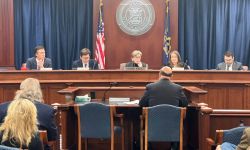Michigan Republicans launch attack on Gov. Whitmer’s emergency powers

April 24 update: Gov. Gretchen Whitmer expected to extend stay-home order until May 15
Republican leaders are calling legislators back to the Michigan Capitol on Friday to assert their role in responding to the coronavirus pandemic with additional oversight and an attempt to limit Democratic Gov. Gretchen Whitmer’s emergency authority.
The House and Senate will meet to form a “special oversight committee” on the state’s handling of the coronavirus pandemic, Speaker of the House Lee Chatfield, R-Levering, announced Thursday on Twitter.
Senate Republicans also plan to vote for the repeal of a 1945 law that Whitmer contends gives her authority to continue emergency actions beyond May 1 without legislative approval, a symbolic act given the governor’s ability to veto the measure.
- The latest: Michigan coronavirus map, locations, updated COVID-19 news
- What Michigan's new coronavirus stay-at-home executive order means
- Can you buy seeds in Michigan? Confusion reigns over Whitmer stay-home order.
- When Michigan unemployment, stimulus checks, and $600 CARES money will arrive
“Michigan needs to handle this pandemic seriously yet properly. It’s what the people deserve, and we will see that it happens,” Chatfield wrote on Twitter.
The announcements come days before the end of Whitmer’s extended stay-at-home order, which has inflamed frustrations among the GOP and conservative groups who say they are concerned it’s too restrictive. Republican leaders also face pressure from within their own caucuses to take more aggressive steps against the governor.
Whitmer said Wednesday she intends to extend her order past the end of April while beginning to reopen the Michigan economy in phases, arguing that reopening businesses too early could lead to a second wave of coronavirus cases that could overwhelm hospitals.
Tiffany Brown, spokesperson for the governor, condemned the Legislature's moves as “dangerous partisan games.”
"Governor Whitmer will remain focused on taking actions to save lives and mitigate the spread of the virus during these unprecedented times," she said, adding that Whitmer "will not sign a bill that would diminish her ability to protect citizens of this state from a deadly disease that has already killed thousands of people in Michigan."
Gideon D’Assandro, spokesperson for Chatfield, told Bridge the panel would be similar to a joint committee formed in 2016 to examine government actions related to the Flint water crisis while Republican Gov. Rick Snyder was in office. That committee listened to more than 60 witnesses over 18 hours of testimony and released a report urging policy changes they argued would help Flint residents and prevent future catastrophes.
“They’re not being created to look into any particular issue,” D’Assandro said. They’ll “start looking into the state’s response given whatever kind of leads they get and go wherever that evidence takes them.”
The committee would have the power to issue subpoenas for government records and testimony from state officials, but they don’t intend to force “private-side citizens” to testify.
A majority of House members will be in Lansing to enact the resolution, D’Assandro said, and they plan to take health screening procedures to reduce the likelihood of spreading COVID-19, similar to the last time the Legislature met in early April. The House will not consider any other legislation while they’re in town.
Amber McCann, spokesperson for Senate Majority Leader Mike Shirkey, said the Senate plans to approve the House resolution and will also limit the number of people allowed on the chamber floor.
House Democratic Leader Rep. Christine Greig, D-Farmington Hills, said the session was "planned under the cover of night" without input from Democrats and that the resolution would forward "a false narrative of distrust in our governor’s response that will ultimately cost more lives." Senate Democratic Leader Jim Ananich, D-Flint, also said in a statement that the move is a “stunt” that should be saved for “a time when Michiganders’ lives aren’t on the line.”
“The only reason we should be in session is to approve the governor’s order to make safe changes for Michigan,” he said. “Our residents are fighting for their lives. They’re looking for leadership and certainty, not politics.”
Republicans outnumber Democrats 22 to 16 in the state Senate, and 58 to 52 in the state House.
Partisan tensions have been rising in recent weeks over Whitmer’s handling of the coronavirus pandemic. Despite early support for her executive orders, Republicans have criticized the administration for what they say are sweeping restrictions that are needlessly devastating the economy.
Whitmer initially announced a stay-at-home order in late March, but expanded it on April 9 to include additional restrictions on large retail stores, travel and some recreation.
Conservative groups expressed frustration with the order’s ban on motorized boating, professional lawn care services and other restrictions they argued were unnecessary to protect public health. Thousands came to Lansing last week to protest the restrictions, becoming one of the first in a nationwide wave of demonstrations against state stay-at-home measures.
Republican leaders have promoted their own plans to reopen businesses more quickly in areas with fewer confirmed cases, and GOP legislators have introduced bills to repeal a 1945-era law that allows Whitmer emergency powers without legislative approval, though she would likely veto the legislation even if it were to pass.
Thousands of protesters gathered at the Michigan Capitol last week, some in cars and others on the lawn, in defiance of Whitmer’s stay-at-home order.
“There is need now to express our opinions, concerns, and frankly, demands,” he wrote in a Facebook post. “But there is no need, and never should be, to threaten government leaders to the point of putting their lives at risk. No need. No space.”
But some Republican lawmakers want to relax economic restrictions even faster than their caucus leaders: Sen. Tom Barrett, R-Charlotte, told Bridge Magazine Thursday that the plan released by Shirkey last week is “not my plan.”
“Ultimately we have to legislatively look at what is the appropriate way to go about this, but I’m much more on the side of giving people the freedom to make their own decisions,” said Barrett, lead sponsor on a bill to repeal the Emergency Powers of Governor Act of 1945.
“We should all be very concerned that any person ... is seeking to have unilateral control of state government for any period of time longer than is absolutely necessary to deal with a threat we’re facing,” he said.
Republicans have also cried foul over a contract the Whitmer administration awarded and then quickly rescinded that would have paid a firm owned by a Democratic consultant up to $194,250 to oversee a volunteer contact tracing program designed to help track the spread of the novel coronavirus through Michigan.
State and national GOP leaders blasted the no-bid contract with Great Lakes Community Engagement, a Grand Rapids firm owned by Mike Kolehouse that was going to use virtual phone bank software developed by EveryAction, a subsidiary of Democratic campaign group NGP Van.
Michigan Republican Party Chairwoman Laura Cox questioned whether patient data collected by the firm could be “utilized for partisan ends” and called that possibility “deeply troubling.”
The 17-page contract, signed Monday but canceled Tuesday and provided to Bridge Magazine, would have required GLCE to comply with medical record privacy laws and included an additional three pages of privacy requirements, including limitations on staff access to both electronic and physical data.
Whitmer’s office said the contract was approved by the Michigan Department of Health and Communication but should have gone through the State Emergency Operations Center, which is overseeing contracts during the public health crisis.
"The Department of Health and Human Services doesn’t have a political bone in their theoretical body," Whitmer said Wednesday in a public briefing. "When it was brought to my attention, I told them to cancel it. This was an unnecessary distraction. Leadership is about solving problems. The correct process was not followed.”
House Appropriations Chairman Shane Hernandez, R-Port Huron, said Tuesday he is concerned about a partisan firm collecting “personal and sensitive information about Michigan citizens” and called for additional contract oversight.
“I can’t believe this is the only instance where this administration has made questionable decisions about awarding contracts that may be political in nature during this time of unprecedented executive power,” Hernandez said in a statement. “The people of Michigan, as well as their elected representatives, have so far been left in the dark about how our governor is making these decisions and that must come to an end.”
RESOURCES:
- Hey, Michigan, here’s how to make a face mask to fight coronavirus
- Michigan coronavirus dashboard: cases, deaths and maps
- Michigan families can get food, cash, internet during coronavirus crisis
- How to give blood in Michigan during the coronavirus crisis
- 10 ways you can help Michigan hospital workers right now
- Michigan coronavirus Q&A: Reader questions answered
- How to apply for Michigan unemployment benefits amid coronavirus crisis
See what new members are saying about why they donated to Bridge Michigan:
- “In order for this information to be accurate and unbiased it must be underwritten by its readers, not by special interests.” - Larry S.
- “Not many other media sources report on the topics Bridge does.” - Susan B.
- “Your journalism is outstanding and rare these days.” - Mark S.
If you want to ensure the future of nonpartisan, nonprofit Michigan journalism, please become a member today. You, too, will be asked why you donated and maybe we'll feature your quote next time!




